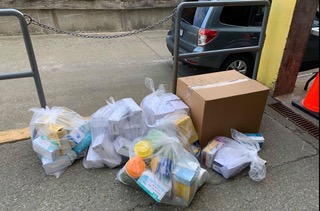Issues Blog
Innovation as the foundation of a post-COVID19 economic recovery plan
Today the BC Government released the final report from Dr. Alan Winter, BC’s former Innovation Commissioner. As noted in the accompanying government press release, Dr. Winter’s report makes the following recommendations:
- fund the establishment and operation of “innovation precincts” across B.C.;
- support the development of emerging technology clusters;
- use the CleanBC plan as an economic driver;
- incent and protect intellectual property; and
- invest in leadership talent development strategies.
Over the last two years I had numerous meetings with Dr. Winter as he developed his final report. Needless to say, I am very supportive of the report’s recommendations. His recommendations will be invaluable in helping B.C.’s tech sector to advance and are of particular importance, given our collective challenge of economic recovery in the wake of COVID-19. B.C. is well placed to support and apply technology and innovation as we build a sustainable, low-carbon economy that will benefit all British Columbians.
The BC Government also released the final report of the Emerging Economy Task Force today. As noted in the accompanying government press release, the report made 25 recommendations presented within five key strategic priorities:
- embracing technology and innovation
- leveraging B.C.’s green economy
- building a highly skilled and adaptable workforce
- ensuring an effective enabling ecosystem
- demonstrating public sector leadership
An Emerging Economy Task Force was proposed as a means of addressing how technology, innovation and global trends are changing business and society. To stay competitive, B.C. must anticipate the challenges and opportunities associated with change and how they impact the many sectors of our economy, from forestry and mining to tourism and clean technology.
Prior to the release of the reports I met with the Michelle Mungall, Minister of Jobs, Economic Development and Competitiveness, and Rick Glumac, Parliamentary Secretary for Technology to brainstorm ways of moving forward with the innovation agenda. It’s clear to me that government is excited about the potential for economic advancement in the ways outlined in the aforementioned reports. I look forward to working with the Minister and Parliamentary Secretary as the reports’ recommendations are implemented.
The creation of an Innovation Commission as well as an Emerging Economy Task Force were key aspects of the strategy for the new economy component of the BC Green Party Platform that I championed in the 2017 Provincial Election. I was delighted that the BC NDP shared my vision and agreed to including both as key elements of the Confidence and Supply Agreement.
Over the last three years it has been a distinct pleasure working with government, Dr. Alan Winter (Innovation Commissioner) and Ms. Kathy Kinloch (Chair, Emerging Economy Task Force and President of BCIT) as these reports were developed. I wish to extend my sincere thanks to all members of the Emerging Economy Task Force, as well as Dr Winter, for their exceptional work that will be invaluable as we move forward with a post COVID19 recovery plan.
Island Medical Program students stepping up in response to COVID-19
Over 60 Island Medical Program students are participating as volunteers in a student-led initiative to serve the community in response to the COVID-19 pandemic. They are providing a number of key services in our community, including:
- Contactless grocery delivery to seniors
- Assisting GPs with wellness phone checks with vulnerable patients
- Helping an inner-city response team respond to support our homeless population
- Childcare and pet care for front line workers
- Collecting PPE donations for Island Health
- Volunteering with UVic’s 3D printing of face shields for front line workers
 Madelaine Beckett (Class of 2021) began working with Jesse Spooner and Amy Kim (Class of 2020) to coordinate the outpouring of requests from students for opportunities to get involved supporting the community. Their early work included childcare, pet care and running errands for front line healthcare workers. Thanks to their early efforts, the initiative quickly expanded as new ideas came on board. Max Moor-Smith (Class of 2020) joined to lead an initiative to collect personal protective equipment and support the 3D printing project at UVic.
Madelaine Beckett (Class of 2021) began working with Jesse Spooner and Amy Kim (Class of 2020) to coordinate the outpouring of requests from students for opportunities to get involved supporting the community. Their early work included childcare, pet care and running errands for front line healthcare workers. Thanks to their early efforts, the initiative quickly expanded as new ideas came on board. Max Moor-Smith (Class of 2020) joined to lead an initiative to collect personal protective equipment and support the 3D printing project at UVic.
 Emily Lerhe and Caroline Spaner (Class of 2022) are leading a project called Bag Half Full to provide grocery delivery to seniors. There are now about 20 volunteers doing the shopping and deliveries. This was modeled on a project started at the University of Alberta, which has now expanded to other campuses across Canada.
Emily Lerhe and Caroline Spaner (Class of 2022) are leading a project called Bag Half Full to provide grocery delivery to seniors. There are now about 20 volunteers doing the shopping and deliveries. This was modeled on a project started at the University of Alberta, which has now expanded to other campuses across Canada.
Madelaine Beckett and Jesse Spooner and two others from the Class of 2021 (Emma Woo and Rita Wakelin) have been working to provide administrative support to the Victoria Inner City COVID-19 Response Team, a physician led group working to address the dual crisis of homelessness and COVID-19. In addition to the administrative work, they have recruited volunteers for assembling donated cell phones with SIM cards and software to support healthcare outreach to this vulnerable community.
 Other students have returned to work in their pre-medical school careers as paramedics and nurses. Many students are engaged in research projects dealing with COVID-19.
Other students have returned to work in their pre-medical school careers as paramedics and nurses. Many students are engaged in research projects dealing with COVID-19.
We are fortunate and grateful for the tremendous efforts of the Island Medical Program students. Thank you for stepping up so quickly to respond to the needs of the community. You have made a huge difference in the lives of so many people.
 The Island Medical Program delivers the UBC MD program in collaboration with UVic and Island Health. Based on UVic campus and at affiliated healthcare centres across Vancouver Island, the program was created in 2004 to help address regional shortages of physicians, particularly in remote, rural and indigenous communities.
The Island Medical Program delivers the UBC MD program in collaboration with UVic and Island Health. Based on UVic campus and at affiliated healthcare centres across Vancouver Island, the program was created in 2004 to help address regional shortages of physicians, particularly in remote, rural and indigenous communities.
Both CHEK TV and the Oak Bay News have covered the remarkable, and selfless, contributions of these young medical-professionals-in-training.
On the gaps that exist in economic supports available to individuals & businesses during the COVID-19 pandemic
Without a doubt, British Columbia has led the way in North America in terms of introducing measures to curb the spread of the COVID-19 virus in our province. We are very fortunate that so many people are following the advice of Health Minister Adrian Dix and Provincial Health Officer Dr. Bonnie Henry. Thank you to all for staying the course during these difficult times.
Nevertheless, with Canada just over one month into a nationwide lock-down we are beginning to get a better idea of where the gaps are in the existing economic supports and where further relief is needed. Since many of the initial government interventions were broad in scope, needs specific to different industries have been left unaddressed by the existing programs. In BC, a BCC survey found that the current programs were of little use to one third of businesses, with nearly half of businesses with under five employees reporting that they do not find the existing programs to be helpful. Ongoing email exchanges and conversations with British Columbians have also revealed additional gaps in the existing programs. Some of these are highlighted below.
The Tourism Industry is Reeling
Unsurprisingly, sectors dependent on in-person interactions such as the hospitality and tourism industries have been among the hardest hit by the pandemic. For many businesses in the tourism industry, capital expenditures are typically made during the off-season and are offset by revenue generated throughout the summer months. However, the combination of social distancing measures, travel restrictions, and the closure of BC Parks and Natural Reserves has meant that tourism operators have been forced to grapple with hundreds of last-minute cancellations just as their busiest season was about to begin. With many businesses needing to service pre-existing debt loads, the loss of summer revenue has placed them in a precarious position. Exacerbating matters is the fact that many operators have had limited success in negotiations with travel insurance companies around the reimbursement of guests’ travel costs.
Currently, the economic supports introduced by the federal and provincial governments do not adequately address the scale and scope of the challenges that the industry faces, particularly given its seasonality. Assistance offered by the private sector such as deferring loan payments for three months are only stop-gap measures because payments will eventually come due. Additional solutions proposed to address the issues the tourism and hospitality industries are facing have included altering the terms of the existing loan programs to provide longer repayment periods, larger loan guarantees, and determining loan eligibility on a per property basis rather than a per owner basis.
Rent Assistance
One concern common to both individuals and businesses is the ability to pay rent. Even before the current economic crisis began, the high cost of living in urban areas was a pressing issue in federal and provincial politics. Rent prices have been increasing over the last decade and as of November 2019 the average rent in Vancouver was $2,507 per month. In Oak Bay, just under 20% of households fall below the affordability standard, defined as spending 30% or more of income on shelter costs.
Although Ottawa and Victoria have stepped in to provide the Canada Emergency Response Benefit (CERB) and the BC Temporary Rental Supplement Program (BC-TRS) respectively, many individuals have indicated that the existing supports will not be enough to get them through the crisis, particularly given the fact that relief from other recurring expenses such as mortgage payments, property taxes, utility bills, and debt payments are only temporary. If people are unable to make rent payments, hundreds of tenants could be facing eviction when the crisis is over. The impact of missed rental payments would also be acutely felt by landlords, many of whom are reliant upon rental income to make mortgage payments or to support their retirement.
On a commercial level, almost 60 percent of Canadian small businesses have said that they will be unable to pay rent come May 1st. The situation is particularly urgent in the food service industry where three quarters of respondents to a Restaurant Canada survey reported that that rent was a primary source of business debt.
Solutions floated to the issues facing renters and landlords have included increasing the provincial rent supplement, and federal government intervention to support renters by topping up the CERB payment. The recently announced Canada Emergency Rent Assistance program should provide much needed relief to small businesses but will need to be closely monitored to determine if it is ambitious enough. Many small business owners have expressed their reluctance to take on more debt and may require further support in the weeks ahead.
Ongoing Restrictions to the Canada Emergency Wage Subsidy
While making the criteria for the Canada Emergency Wage Subsidy more flexible has helped more businesses qualify for the program, many firms have indicated that they are still slipping through the cracks. Currently, only one third of businesses in BC are confident that they will qualify for wage subsidy, with 28% of businesses reporting that their revenue has not declined enough to meet the eligibility requirements. This issue is particularly pressing for businesses that have experienced revenue declines but are still trying to stay open to provide services to customers. Without additional support many of these businesses will be forced to close and layoff their employees, making an eventual economic recovery all the more difficult.
Unaffordable Childcare Costs
Both the province and the federal government have taken steps to ensure that essential service workers are able to access child-care throughout the pandemic. At the federal level, the CERB has been extended to those forced to care for their children at home and the Canada Child Care Benefit has been increased by $300 per child. In BC, the provincial government has prioritized spaces in child-care centres for essential service workers and has provided access to child-care services for school aged children through schools themselves. Yet despite these measures, essential service employees with children above the age of five are still struggling to find affordable child-care services. In some school districts, schools no longer have the capacity to offer child-care, forcing parents unable to work from home to resort to private options. For many households, the costs of private child-care are too high to remain a viable long-term solution to the lack of in-school supports.
Throughout the pandemic, essential service employees have been deservingly lauded as heroes for their selfless commitment to others. With some of these workers still struggling to find affordable child-care for their children, Ottawa and Victoria need to address the gaps in the existing support network so that workers in essential industries can continue to provide the services that British Columbians count on. If further support does not come soon, essential services workers may be forced to quit their jobs to care for their children at home.
Possible options here could include extending childcare services to out of district students if there are enough spaces available, distributing additional tax credits to families, or making the criteria for the CERB more flexible to cover a portion of the costs of childcare for essential service workers.
Supporting Individuals and Businesses
At the moment, there is a narrow window of opportunity for governments to act to aid struggling sectors and individuals. Many businesses are dangerously close to being forced to permanently close and cannot wait much longer for further assistance. Going forward, the government might focus on ensuring that as many individuals and businesses as possible can access their programs. Given the consequences of not doing enough, I am of the view that it is is better to do too much than to do too little.
Support for small business as the COVID-19 pandemic plays out
Over the last two weeks governments across Canada have introduced some of the most far reaching and ambitious programs in recent memory to deal with the economic fallout of COVID-19. The policymakers and civil servants behind these supports deserve to be commended for the speed at which they have acted and for their ingenuity. Despite these unprecedented government interventions into the economy it is becoming increasingly clear that the measures introduced so far are not enough. Many businesses are slipping through the cracks of the available supports and are struggling to make ends meet.
Statistics released by the BC Chamber of Commerce (BCC) and the Canadian Federation of Independent Business (CFIB) on the scale of the economic devastation brought about by COVID-19 are staggering. Two-thirds of the 1,900 businesses polled by the BCC have experienced at least a 50% decrease in revenue and over half are worried that they will face bankruptcy or be unable to resume operations when the crisis subsides. Almost 40 percent of independent businesses surveyed by the CFIB have said that the Canada Emergency Wage Subsidy will not help them and 56% said that they have no fiscal capacity to take on new debt. These statistics released by business advocacy groups are consistent with the daily emails my office has received informing us that the existing measures are not enough. Messages received by my constituency office, ongoing conversations with small businesses and reports from the media highlight gaps in the existing programs. Some of the gaps are outlined below.
Eligibility for the Canada Emergency Business Account
The Canada Emergency Business Account is open to businesses with a total payroll between $50,000.00 and $1,000,000.00 in 2019. However, there are many small businesses with 10 to 20 employees whose payroll exceeds the program’s upper limit. For instance, small health, technology and manufacturing companies whose growth the province has been trying to cultivate will be particularly hard hit by the program’s restrictions.
BC Hydro Small Business Credit
The BC Hydro Small Business Tax Credit defines “small business” as those that qualify for their Small General Service Rate. The effect of this restriction is that numerous businesses with narrow profit margins that use high amounts of electricity (i.e. local restaurants using the medium general service rate) will not be eligible for the benefit. Although BC Hydro does allow payments to be deferred, many of these bills will be due at precisely the same time when businesses will be trying to recover from the crisis.
Restrictions in the Wage Subsidy
The original structure of the Canada Emergency Wage Subsidy worked against small businesses who had experienced substantial declines in revenue but were still trying to stay open to provide services to people. Eligibility requirements originally restricted applications to businesses that have experienced at least a 30% drop in revenue when comparing one month this year to same month last year. This restriction would have meant that businesses whose revenue had decreased by 20% or even 29% would not qualify for the subsidy. The direct effects of restricting the availability of the program would have been further layoffs of workers which defeats the announced goal of the support. As it stands, within the foodservice industry 7 out of 10 businesses will continue to reduce staff hours or lay off more employees if their current situation does not improve. Recently announced changes to the bill will allow businesses to qualify for the subsidy if they can demonstrate a 15 percent drop in revenue in March. Companies will also be permitted use January or February as their base line in certain situations. These changes to the legislation show that the government is listening to business owners. However, continued monitoring is needed to determine if they adequately address the bill’s original flaws.
Profit margins and the use of a ‘one-size fits all’ approach
For many small businesses with narrow profit margins, the difference between remaining viable and facing insolvency is extremely thin, making a substantial decline in revenue potentially devastating. Given the financial position of many small businesses, the measures introduced so far may not be enough to keep them afloat. While the wage subsidy does offer some support, many businesses still have substantial fixed costs (i.e. rent, utilities). These businesses are seeing reduced revenue due to disruption in their supply chains and decreased demand in the economy. Furthermore, numerous already overextended business owners feel that they don’t have the fiscal capacity to take out additional loans. The structure of the existing programs also does little to support small businesses reliant on cyclical or seasonally dependent revenue who have recently seen their sales dry up. For businesses in this position tax deferrals or loans will become difficult to finance with their primary revenue source having evaporated.
Looking Ahead
Going forward, both the provincial and federal government will need to work together to quickly address the gaps in support measures introduced so far. Solutions which have been floated by business groups include: direct payments to business (especially those hardest-hit by the crisis), further reductions in taxes, and supports for businesses unable to pay rent. Other countries may provide models for how to respond as well. Both Norway and Demark have introduced schemes to help companies experiencing revenue losses to pay their fixed costs. Switzerland has launched a program where the small business can apply for interest free loans of up to 10 percent of their annual revenue (SFr500,000 maximum) which are fully backed by the government.
Right now, the current collapse in economic activity is happening at an unprecedented pace. Nearly one quarter of the businesses surveyed by the CFIB stated that they will be unable to make it through the next month without additional support. Within the foodservice industry almost 10 percent of restaurants have already closed and an additional 18 per cent could permanently close by the end of April if current conditions persist. Time is of the essence in getting businesses the support they need.
By expanding the available support programs for small businesses, governments will be reducing the amount of economic hardship experienced by countless numbers of people. Supporting hard-hit businesses will be an incredibly expensive in the short-term. There are major long-term benefits to ensuring that businesses are able to remain operational. Keeping more small businesses solvent throughout the pandemic will help to prevent businesses and workers from needing to re-establish their niches in the economy after the crisis abates. By acting now to support small businesses, governments will be saving central pillars within our communities. These businesses help to make our communities feel like home by providing us with a sense of place and identity. Given the importance of small businesses to our economy and communities, governments must take steps to ensure these businesses are able to emerge successfully from this crisis.
A brief video message to the OBGH residents on the topic of COVID-19
Today I recorded a brief video message from home to the residents of Oak Bay Gordon Head on the topic of COVID-19. In the video I take the opportunity to thank all of those in our community who are helping others and keeping us safe. I also reemphasize the importance of treating the COVID-19 pandemic, and the measures in place to slow its spread, very seriously
The video is reproduced below.







